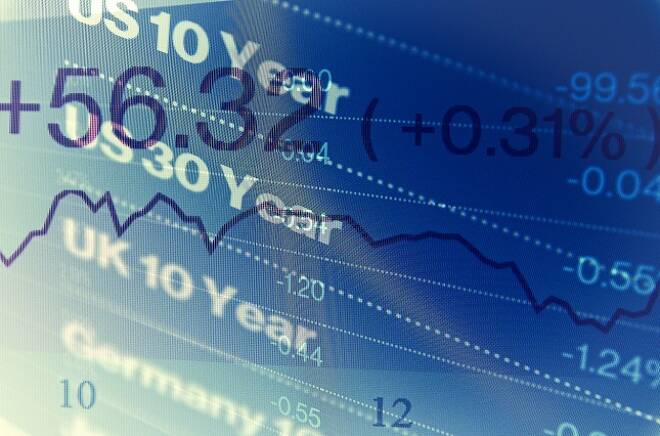Advertisement
Advertisement
U.S. Treasury Yields: Late Week Drop Attributed to Powell’s Warnings, Government Shutdown, Flat CPI Data
By:
Several events influenced the U.S. Treasurys last week including US-China trade talks, the December U.S. Federal Reserve monetary policy minutes, comments from Federal Reserve Chairman Jerome Powell and U.S. consumer inflation data.
U.S. Treasurys retreated on Friday on expectations the U.S. Federal Reserve is in no hurry to raise interest rates. Additionally, a government inflation report showed a decline in December, stoking investor appetite for Treasurys, pushing their yields lower. Safe-haven buying spurred by stock market losses also underpinned Treasury yields.
The yields on the benchmark 10-year U.S. Treasury notes fell 3.2 basis points, settling at 2.699 percent, while holding below a two-week peak reached earlier in the week. The 2-year U.S. Treasury notes settled at 2.543 percent, down 2.2 basis points and the 30-year Treasury bond closed at 3.033 percent, down 1.8 basis points.
Several events influenced the U.S. Treasurys last week including US-China trade talks, the December U.S. Federal Reserve monetary policy minutes, comments from Federal Reserve Chairman Jerome Powell and U.S. consumer inflation data.
US-China Trade Talks Calm Investors
Treasury investors read last week’s three-day mid-level trade discussions between the United States and China as positive, however, there are still challenges ahead. U.S and China officials made more progress on straightforward issues such as working out the details of Chinese pledges to buy a “substantial amount” of U.S. agricultural, energy and manufactured goods and services, sources said. However, major issues such as forced technology transfers, intellectual property rights, non-tariff barriers and cyber-attacks, still had to be worked out.
Late in the week, optimism over the U.S. and China reaching a trade deal increased further after U.S. officials said they expect China’s top trade negotiator to visit Washington later this month, signaling higher-level discussions are likely to follow last week’s talks.
Fed Minutes Confirm Dovish Fed
The minutes of the Fed’s December monetary policy minutes showed the central bank’s willingness to delay further interest rate hikes given ongoing concerns over financial market instability and volatility as well as signs of slowing global economic growth.
Furthermore, policymakers cited concerns over slowing inflation saying, “many participants expressed the view that, especially in the environment of muted inflation pressures, the FOMC could afford to be patient about further policy firming,” the minutes showed.
Policymakers went on to argue that muted inflation readings allowed the Federal Reserve “some latitude to wait and see” how the data presented itself going forward.
Overall, the Fed minutes suggest a cautious approach to future monetary policy changes.
New Warnings from Fed Chief Powell
U.S. Federal Reserve Chairman Jerome Powell surprised Treasury investors on Thursday when he warned that an extended partial government shutdown could damage the U.S. economy and prevent the Fed from obtaining key economic data it needs to make monetary policy decisions.
Powell also warned about a slowdown in the Chinese economy saying, “The Chinese economy is slowing down. It’s showing up a lot in consumer spending. Weak retail spending; everyone has seen the Apple news.”
Powell also expressed concerns over global growth. “The principal worry I would have is really global growth. If you look at Asia, Europe, you’re seeing growth in growth. The question would be how does that affect us,” Powell said.” “It’s a tightly integrated global economy, global markets, and we will feel that,” he went on to say.
Finally, Powell said he is concerned about rising U.S. debt. “I’m very worried about it,” Powell told those at the Economic Club of Washington, DC, on Thursday. “From the Fed’s standpoint, we’re really looking at a business cycle length: that’s our frame of reference.”
Weak Energy Prices Drag Down U.S. Consumer Inflation
U.S. consumer price data on Friday was little changed in December while weaker energy prices dragged down a broader gauge of inflation. This supported the notion the Fed would take a pause in further rate hikes.
The U.S. Labor Department said, the so-called Core Consumer Price Index rose 2.2 percent from a year earlier for a second month and increased 0.2 percent from November, matching the consensus estimates. The broader-based CPI cooled to a 1.9 percent annual gain and was down 0.1 percent from the prior month as energy costs fell the most in almost three years.
About the Author
James Hyerczykauthor
James Hyerczyk is a U.S. based seasoned technical analyst and educator with over 40 years of experience in market analysis and trading, specializing in chart patterns and price movement. He is the author of two books on technical analysis and has a background in both futures and stock markets.
Advertisement
